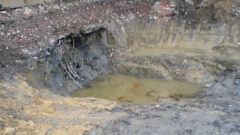
How Sea-dwelling bacteria could help humans breathe on Mars
The Martian was on of 2015’s big blockbusters. Matt Damon alone on the Red Planet, finding ingenious ways to survive until the team at NASA work out a way to get him home. It appeals because, having conquered the moon, humanity now looks to the next big conquest: Mars. Rather than the moon, it seems to be favoured for possible human colonisation in the future. But what’s the point of speculating about living on a planet we wouldn’t be able to breathe on?
Cyanobacteria holds the key
June 2018 saw a team of researchers publish the results of a study in which a family of bacteria called cyanobacteria is linked to the possibility of oxygen supply. The study, featured in the journal Science, demonstrates how cyanobacteria uses photosynthesis in a similar way to plants.
The bacteria live in some of Earth’s most inhospitable environments and use photosynthesis to produce energy. One of the waste products of this process is oxygen. Some of the deepest trenches in the ocean are home to cyanobacteria, which use a specific type of chlorophyll, chlorophyll -f, to convert red/near infrared light into energy, as opposed to visible light.
So what’s this got to do with living on Mars? Well, because the organism can survive in hostile environments, it could potentially be sent to Mars to produce oxygen for future colonists. Given that it has been found to survive on the surface of the International Space Station, it seems like a viable option.
The mission
Mars’ atmosphere currently holds just 0.13% oxygen, compared with 21% here on earth. To test whether oxygen levels can be increased, a NASA robot loaded with microbial life is being sent to the Red Planet in 2020. The aim is for the robot to feed this life onto the planet’s surface and see if it discharges enough oxygen to make the air fit for humans to breathe.
NASA’s plans have been taken a step further by inventor Elon Musk, who plans to start sending cargo ships to Mars in 2022. These would have the mission of finding a viable source of water on the planet. The ships would also, he claims, place power, mining and life support systems there that could help support future missions.
It goes without saying that such an ambitious project will involve huge investment. Musk told an audience at the International Astronautical Congress that funding would come from activities such as launching satellites and servicing the International Space Station.
Entering astronautics
With colonisation of Mars finding momentum in the astronautical world, now is an exciting time to join the sector. Much of the technology planned for Mars – including SpaceX’s rockets – have the potential to be scaled down for use here on Earth. Entering this sphere necessitates, of course, a substantial start-up business grant to enable feasible prototypes to be created. For help with obtaining business grants for your project, contact R&D Tax Solutions today.





